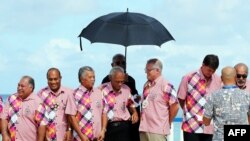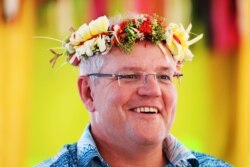Australia is offering vulnerable South Pacific nations $340 million to help them deal with the effects of climate change. The announcement came ahead of a visit by Prime Minister Scott Morrison to Tuvalu for the Pacific Islands Forum this week, where Australia’s reliance on fossil fuels was a dominant issue.
Australia wants to help its Pacific neighbors invest in renewable energy and make their roads, hospitals and schools able to withstand extreme weather events.
But Morrison met resistance in Tuvalu at a meeting of Pacific leaders. They have been urging Australia to phase out the use of coal that generates most of its electricity and generates billions of dollars in export earnings.
Questions about aid
That appears unlikely, and Australia recently approved a huge new coal mine in the state of Queensland to be run by an Indian company, Adani.
Island nations fear that fossil fuels are endangering their way of life as global temperatures increase and the seas rise. Some low-lying communities have already been inundated, and there are concerns that many more will follow.
Simon Bradshaw from Oxfam Australia, an independent aid organization, believes Australia’s offer of financial assistance to the Pacific needs careful scrutiny.
“There are very important questions around the details of this announcement,” he said. “Is it additional money? It does not seem so. It seems to be taken from the existing and rapidly diminishing aid budget. But, of course, the elephant in the room is still on the one hand providing some assistance, on the other hand Australia’s emissions (are) still going up. We are the world’s largest producer of coal and gas.”
Way of life in danger
Fiji’s Prime Minister Frank Bainimarama said that climate change posed “an existential threat” to island nations.
Samoa’s leader Tuilaepa Sailele has said previously that any world leader who denied the existence of warming temperatures was mentally unstable.
The Pacific Islands Forum was founded in 1971. It has 18 members, including Australia, French Polynesia, Tonga, New Zealand and Papua New Guinea.
It aims to become a “region of peace, harmony, security … and prosperity.”





